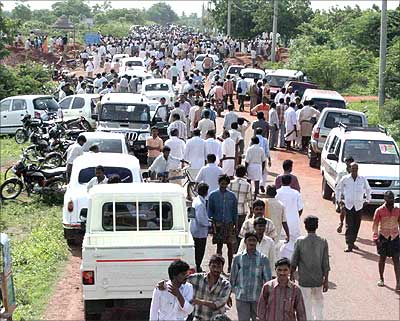 The Maoists are at it again. After lying low for quite sometime, the outlawed Maoists have struck again by targeting Andhra Pradesh former chief minister Nedurumalli Janardhana Reddy and his wife and minister N Rajyalakshmi. Though the VIP couple had a miraculous escape, another car in their convoy was hit, killing three persons.
The Maoists are at it again. After lying low for quite sometime, the outlawed Maoists have struck again by targeting Andhra Pradesh former chief minister Nedurumalli Janardhana Reddy and his wife and minister N Rajyalakshmi. Though the VIP couple had a miraculous escape, another car in their convoy was hit, killing three persons.
The incident is yet another bolt for the beleaguered Congress government and the Andhra Pradesh police. It is obvious that the Maoists meticulously planned the attack. They knew in advance that Reddy was to receive an honorary doctorate from Sri Venkateswara University on Friday morning in Tirupati. Accompanied by his wife, he started at 6.30 am from their hometown Vakadu.
As their convoy was passing over a culvert on Gudur highway, Maoists blasted a landmine using a camera flash. Though it was a high-precision attack, Maoists could only blew up a car that followed the bullet-proof car in which Janardhana Reddy and Rajyalakshmi travelled. But their followers and the driver had to pay with their lives.
The reasons for the attack are obvious. Over 15 years ago, on May 21, 1992, as the then Chief Minister, Reddy banned the Communist Party of India-Marxist-Leninist (People's War) for the first time, marking the first death anniversary of former prime minister Rajiv Gandhi. The People's War was outlawed following the killing of former AP minister T Hayagrivachari, a close associate of the then prime minister P V Narasimha Rao, at Hanamkonda by Maoists.
The ban remained in force during the tenure of Janardhana Reddy's successor, the late Kotla Vijayabhaskar Reddy.
After the ban was relaxed for a while during N T Rama Rao's second innings as Chief Minister, his son-in-law and successor N Chandrababu Naidu re-imposed the ban in July 1996. The Congress government, headed by Dr Y S Rajasekhar Reddy, relaxed the ban on Maoists in July 2004 and initiated peace talks in October. The peace talks failed, as Maoists resorted to killings. The ban was re-imposed in August 2005 after Maoists gunned down Congress MLA Chittem Narsi Reddy and nine others at Narayanpet on the Independence Day.
The Andhra Pradesh police claimed to have broken the base of Maoists in the state through sustained operations over the last two years. The police killed 139 Maoists in encounters in 2006 as against 163 during 2005. They also arrested 732 Maoists in 2006 compared to 938 in 2005.
Then, 321 Maoists surrendered in 2006 as against 894 in 2005. The arrest of 'Tech Madhu' led to the recovery of a huge cache of 322 weapons, 875 rockets, 27 rocket launchers and huge quantity of explosives during 2006. Maoists, on their part, committed 183 violent incidents in 2006 as against 535 in 2005. They killed 37 civilians in 2006 as against 186 in 2005. They also killed in 10 policemen in 2006 compared to 10 in 2005.
Maoists suffered heavy casualties with the killing of AP state committee secretary Madhav, state committee members Ravi Kumar and Satyam and central committee members Sande Rajamouli and Somanna since 2006. The police claimed to have virtually contained Maoist activity in Nallamalla forests, Godavari valley in north Telangana and on the Andhra-Orissa border area through encounter killings, arrests and surrenders. Greyhounds (the elite anti-Moist commando force of the AP police) earned praise from the Union home ministry and Prime Minister Manmohan Singh for "spectacular successes" achieved in AP.
But, before the state government and the police could recover from the shock of the terror attacks in Hyderabad--the bomb blast at Mecca Masjid during Friday prayers on May 18 and the twin blasts in the city on August 25, the resurgence of Maoist violence in the state deals a severe blow to the police and the ruling Congress.
The fact that the abortive bid was made on a former chief minister who is on the hit-list of Maoists and who is being provided with heavy security cover only shows that Maoists are 'down but not out'. They still retain their lethal power to hit at their targets at places and time of their choice to take the police and government by surprise.
Earlier, on October 1, 2003, the then chief minister N Chandrababu Naidu was injured at a landmine blast by Maoists at Alipiri. In March 2000, the then Panchayat Raj Minister A Madhava Reddy was killed in a landmine blast near Ghatkesar. Several MPs and ex-MPs and MLAs and former legislators were killed by Maoists in the last two decades. Janardhana Reddy should consider himself twice lucky as the police had earlier foiled a plot to blast a landmine to blow up his car in Guntur district in February 2003.
Andhra Pradesh faces tough times ahead with the growing challenge from the terrorists and Maoists.
Text: Syed Amin Jafri | Photograph: Snaps India






 © 2025
© 2025